- Home
- Gerald Hammond
The Executor (Keith Calder Book 10) Page 4
The Executor (Keith Calder Book 10) Read online
Page 4
‘You are silly, Dad,’ Deborah said. ‘There’s no traffic-warden.’
‘I know, but at least it got rid of him. We have an urgent visit to make. On the way we’ll make a little detour, drop the boxes in the car and feed the meter.’
*
The Cowgate dips to pass under George IV Bridge. As they walked through its echoes and between the backs of tall buildings in reddish stone, Keith asked, ‘If that fowling-piece had been half the price, would you have bought it?’
‘Of course,’ Deborah said firmly. ‘Why not?’
‘Most girls, let loose with their dad’s wallet, would make a bee-line for the nearest boutique.’
‘Most girls are wet,’ Deborah said. ‘Boys are better, as long as they don’t get soppy.’
‘Sometimes I worry about you,’ Keith said. ‘I don’t know whether I’ve got a son or a daughter. You have the worst vices of both. Anyway, you’d have been done. Have a look at that fowling-piece next time we go that way. It’s a fake.’
‘Really, Dad? I’ll swear the barrel and action are genuine. I saw that it had been re-stocked, but I was sure that it had been done during the period. I was wrong, was I?’
‘It was re-stocked about the time you were born. But don’t feel too badly about it, Toots. The ageing was brilliantly done,’ Keith said. ‘I know, because I did it myself. I was a bit short of funds at the time. Ah, Waterman’s Lane.’ They turned the corner into a narrow street serving a mixture of tired buildings, mostly of an industrial nature. ‘And that looks like the place I want, along on the left with the green sign.’ The sight of a phone-box reminded him. ‘You phone your mother. Dial one hundred and reverse the charges. When you’ve finished, follow me up. If you hear any loud noises or see anything you don’t like, go back and phone the police?’
‘Nine-nine-nine?’
‘You’ve got it.’
The signboard for Frazer’s Frozen Foods was on the gable of a small public house. Keith guessed that the sign applied to the adjacent building, which was set back just enough to allow for a small yard where a grey van was parked. Looking through the back windows, he saw that the van seemed to be empty except for a stack of crumpled newspapers. The uppermost was the front page of a Sun still bearing the newsagent’s scribble for the delivery boy. It looked like Donelly.
After the bustle of Edinburgh’s crowded streets the lane was unnaturally quiet. Keith moved over quickly to double doors painted a flaking green. There was no bell so he banged with his fist. There was no answer or sound of movement. He wondered where to go from there. As an afterthought, he tried the handle and found that the door was unlocked.
The lane was still as quiet as a graveyard. Keith gave the heavy door a push and slipped inside. His first impression was that the store was tidy but that neatly ranged around the painted brick walls were the unsold items which Duncan Laurie had picked up – valueless inclusions with job lots, broken furniture awaiting repair or cannibalisation and odd numbers of chairs kept in the hope of completing the set. Opposite, a workbench bore tools, polishes and a tallcase clock in process of undergoing repair to a damaged corner. The place smelt of new polish and mouldering upholstery.
He moved forward. The door and a wormy wardrobe had been hiding the horror in the corner. Keith’s first impulse was to run but he steeled himself and stepped forward, placing his feet with care.
Duncan Laurie had sold Keith a powder-flask and a walking-stick gun and had, from time to time, offered him other less tempting, faked or possibly stolen pieces. So Keith knew his face and could recognise its profile among the mess. And, as if that were not enough, he could smell the knocker’s hair-oil even above the odours which accompany a violent death.
Deborah must not see this, or smell it. She would be with him at any moment. But no. Two females on the phone . . . He had a minute or two. More likely an hour or so. He stared.
Laurie had slumped forward over the table which, apparently, he used for his paperwork. The wound was nearly closed, but the head was turned a little to one side, causing the wound to gape below the right ear, and Keith could see that his throat was cut. Blood had sprayed over the tidy shoe-boxes of papers on the table, splattered the nearby wall and dripped to the floor.
Keith heard a sound outside. He darted to the door. Deborah was approaching uncertainly. She sighed with relief when she saw her father.
‘Back to the phone,’ Keith said. ‘Dial nine-nine-nine, ask for the police and tell them to come to Waterman’s Lane, the old Frazer’s Frozen Foods building. A crime’s been committed and that’s all you know. Understand?’
Deborah nodded dumbly.
‘Go, then.’
He watched her round the corner and then forced himself to go back inside. On the blood-soaked table was a box of old-fashioned razors of the type which would hold a different razor for every day of the week plus a spare. Seven ivory-handled razors seemed to be in place and one lay under the corpse’s fingers. It looked like a valuable set although it was hard to tell under so much blood.
One of the shoe-boxes had held receipts but the topmost was indecipherable. Keith would have liked to search further down the box but the risk was too great.
A pocket diary lay near to the dead hand. The back cover had stuck to the table with congealing blood. Keith used a ballpoint pen from his pocket to turn the pages. The entries were not methodical, covering only such appointments and phone-numbers as Duncan Laurie had wanted to remember. The last entry was for two days earlier, the day on which Mrs Winterton had sold her late husband’s collection. It said only ‘D. Bruce’, and underneath, perhaps not even part of the same notation, ‘Rutherglen’. Lower still was a vague scrawl which might have been ‘Guns’.
Keith uttered the rudest word he could think of. It was a very rude word indeed. He let the diary fall shut. There was a trace of blood on the end of his pen. He wiped it on the palm of his hand and returned it to his pocket.
Against the wall, to one side of the corpse and slightly behind its shoulder, stood an object which, because it had been in his mind, had been familiar and therefore unnoticed. Now he realised that he was looking at a dower chest. It was almost exactly as he had described it to Deborah. In the middle panel of the front was carved a date, 1573, and to either side initials, K.B. on the left and J.L. to the right. As far as Keith could see, it had escaped being spotted with blood; but the blood was already almost black and spots would hardly show on the very dark oak.
He pulled on his cotton gloves and stooped to lift one end of the chest. It was very heavy but he managed to look underneath. On the concrete was a single spot of what looked like blood. He lowered the chest and lifted its lid. It was empty. He sniffed, but if there was a smell of gun-oil he could not detect it.
Keith removed and pocketed his gloves and spent a few more seconds looking around. It seemed important that he try to fix every detail in his memory although his stomach was urging him to leave the place and find somewhere where he could be quietly and privately sick.
When the first police-car arrived he was waiting beside the grey van. Even the van seemed to be blood-spattered, but he realised after a moment that the splashes of burgundy had been made by berries.
*
The two constables who were the first to arrive were visibly shaken and yet inclined to accept the suicide as a matter of fact and therefore of no great criminal import. The detective sergeant who followed them took a similar view but kept the two Calders waiting anyway while he examined the scene. This was much as Keith had expected. The police, in his experience, considered the convenience of witnesses to be rather less important than their own tea-breaks.
When he judged that the time was ripe, Keith made his move. Deborah, ready to burst with unsatisfied curiosity, was sitting in the back of the panda car playing ‘I spy’ with one of the constables. Keith stooped to the window. ‘I’m going to phone home,’ he said, ‘and then see whether the pub can’t provide a sandwich. It’s past this child’s l
unch-time. And I could use a brandy after what I’ve just seen.’
‘Sergeant said to wait here,’ the constable said uneasily. He was not unsympathetic. He could have used a drink himself after seeing all that blood on an empty stomach.
Keith laughed. ‘Christ!’ he said. ‘I’ll never be more than twenty yards away and you know who I am. You think I’m going to bolt for it, leaving my business in the lurch and my daughter in your hands, just because I found . . . what I found?’
He turned away without waiting for an answer and walked the few yards to the phone-box. He kept his body between the police-car and the dial in case the constable wondered why he had to call Directory Enquiries before phoning home.
After less than a minute, his call completed, he passed the car again and entered the pub. There are lunch-time pubs and evening pubs and this was one of the latter. The old-fashioned bar was empty except for a bored barmaid whose bleached hair was only one of her defences against the advancing years. She brightened when Keith walked in. She produced sandwiches already wrapped in plastic film and mixed Keith a port-and-brandy – a remedy which he always found settling to a disturbed stomach. Her accent reminded him of Mrs Winterton’s description of Duncan Laurie’s.
Keith excused himself. In the Gents, before washing, he sniffed his hands. There was something there which stirred a faint memory but he couldn’t pin it down. He carefully washed his hands and his pen before returning to the bar.
The barmaid was in a sociable mood. ‘Did I hear an ambulance outside?’ she asked. ‘Nobody taken ill, I hope.’
Keith thought for a moment before deciding that she would hear the news soon enough. ‘It was a police-car. Your neighbour seems to have topped himself.’
‘Not Mr Laurie?’ She sounded horrified and yet pleased to find drama on her doorstep on a boring day.
‘You knew him then? He came in here?’
‘Almost every evening. Him and his friend.’ She jerked her head. ‘Always sat at the corner table and had a pie and a pint. How did he . . . do it?’
‘You wouldn’t want to know,’ Keith said. ‘Not a delicately nurtured lady like yourself. Anyway, it’ll be in the papers.’ He offered her a drink and she poured herself a vodka-and-lemonade, much flattered by the tribute to her upbringing. ‘Who was the friend?’ he asked.
She shrugged. With her elbows on the bar, her shoulders did not go up; instead, the rest of her went down. ‘Called him Mike. An older man. I think he’s a french polisher, though why they call him that I don’t know, when French he certainly isn’t. He works somewhere else during the day but helped Mr Laurie doing up his bits and pieces of furniture in the evenings.’
‘You never heard his surname?’
‘I may’ve done. Something Irish.’
Keith remembered the newspapers in the van. Duncan Laurie, dealing largely in delicate objets d’art, would have got through a lot of newspapers. He might well have collected those of his friend. ‘Donelly?’ he suggested.
She snapped her fingers. ‘Right,’ she said.
‘But you don’t know where I could find him?’
‘Not the faintest, dear.’
Keith took out one of his business cards. ‘If he ever comes in here again, give him this. There’s a tenner to split between you if he phones me.’
‘I’ll remember,’ she said. ‘Come back some time and I’ll buy you a drink in return. Not port-and-brandy, though. That’s two drinks.’
He bought some lemonade to go with the sandwiches and hurried outside.
A man with a bag, presumably the police surgeon, was just coming out of the store.
Chapter Three
They had finished their picnic in the panda car, sharing the sandwiches with the constable, before the sergeant was ready to interview Keith. The two men moved into the sergeant’s car.
The detective sergeant’s questions were purely formal. Keith had given some thought to how much he would say and he had decided that he needed police help in tracing the missing guns. He told the sergeant of Mrs Winterton’s folly. ‘I’d done business with Duncan Laurie in the past,’ he explained, ‘and I tracked him down from Mrs Winterton’s description. So if you come across any antique guns, or indications that they passed through his hands within the last few days, such as a large sums of money. . . .’
‘I’ll let you know. Suicide doesn’t suggest that he’d just pulled off a profitable deal. You didn’t interfere with anything?’
‘Only to look and see what had happened, and make sure that my guns weren’t on open show. Now, can I go? My car’s on a meter in Johnston Terrace.’
The sergeant drew a line under his notes. ‘If you get a ticket, contact me,’ he said. ‘I can give you a note to say that you were delayed by the need to help the police. And a fat lot of good it may or may not do you. You’ll get a statement to sign at home. And there’ll be an enquiry in the sheriff court. You’ll have to give evidence.’
‘No trouble,’ Keith said. He collected Deborah and hurried away. Once they were out of sight he found another phone-box. This time he really did phone Molly.
During the hour-long drive back to Newton Lauder, Deborah bombarded him with questions. He spelled out the facts as gently as he could. He refused to describe the body. Time enough for the girl to learn about the macabre side of death later. Besides, now that he had had time to believe the horror of the morning, his own stomach was uneasy again. He tried to clear his mind by observing the harvest as they passed by. It was poor but they might save most of it now that fine weather had arrived at last.
He drove straight to Briesland House – Molly’s orders had been specific and he was glad to comply. Ever since a lucky venture had enabled him to buy the solid, secluded old house, it had been more to him than a home and a status symbol – it had become a safe refuge in times of trouble, a castle where he was king.
Molly met them in the hall. ‘Go and wash,’ she told Deborah and her tone was such that Deborah went without argument. Molly turned on Keith. ‘Did you let that child see any dead bodies?’
‘No, I did not,’ Keith said. ‘And there was only one.’
Molly moved to the second most important question. ‘Have the two of you had anything to eat?’
‘Just a couple of sandwiches. And the bobby in the patrol-car took the lion’s share of those.’
‘There’ll be something hot in ten minutes.’ She looked closely at Keith. ‘You’ve had a shock too. Drink this.’ She disappeared into the kitchen, leaving Keith standing open-mouthed in the hall with a glass of whisky in his hand. Molly still never failed to surprise him.
He followed her as far as the kitchen door. ‘I’ve got things to do,’ he said.
Molly looked up from the frying-pan. ‘Do them here. I took you at your word. Mr Enterkin’s coming here. Sir Peter will look in if he can. Wallace can’t get away, but Janet’s coming instead. Now, tell me the worst, quickly, before Deborah comes back.’
In an irreducible minimum of words, and trying hard not to hear his own voice, Keith described the scene.
Molly accepted the facts calmly. She left the frying-pan while she set the kitchen table and put bread in the toaster. ‘You don’t believe that he killed himself,’ she said. ‘Do you?’
‘No,’ Keith said. ‘I don’t. But how did you know?’
‘I could tell from your voice. And you were careful to say that he “seemed to” have killed himself. I’m glad you came home straight away, but why did you? Knowing you, I’d have expected you to hang around in the hope of picking up the trail of the guns.’
Keith blew out a long breath. ‘You’re getting too damned perceptive! I got away as quickly as I could because I’d already got one clue to where the guns went. And because a forensic scientist will surely see the body and he won’t buy suicide any more than I did. While they have a suicide and no mystery, the cops may be satisfied to have a detective sergeant do the necessary and let witnesses go home, but when they’re investigating a murd
er it’s a different ball-game. Ranking officers, mobile headquarters, dozens of men. And the man who found the body can just bloody well wait until somebody gets around to deciding that they’ve got all he knows. I’ve found a body before now, remember? And I wasn’t bloody well hanging around for that. I’ve got too much to do in a hurry. I’m here and they can talk to me here at my convenience and when I’m good and ready.’
Deborah’s feet were heard on the stairs and the subject was dropped in a hurry.
Molly served kidneys, bacon and mushrooms on toast and while they ate she discouraged questions on Deborah’s part as being ‘ghoulish curiosity’. But when Deborah, after being sworn to secrecy, was despatched to spend what was left of the afternoon with her friend at the nearby market-garden, Molly’s own curiosity was let loose.
‘Keith, why don’t you believe that it was suicide?’ she asked.
Keith finished his coffee. ‘A lot of little pointers. It didn’t look right. His papers were very tidy, yet his blood had spurted all over them. That’d be against nature. There was no note. And a suicide using a sharp blade nearly always makes tentative cuts before he gets up the nerve to do the job.’
‘And there weren’t any?’
‘There were. But one of them, the only one above the line of the main cut, was in an area of unbloodied skin. It was deep but it hadn’t bled, so it was made after death. My guess is that the murderer made the tentative cuts as an afterthought. He may even have gone back to do it.’
‘What do you think happened?’ Molly asked.
‘My guess is that there was a neat and nasty plot. The murderer walked in and offered to sell Laurie a set of old-fashioned razors. Laurie examined them at his table and while he had one in his hand the murderer, standing behind him, produced another razor and made one quick slash.’
‘But he’d get bloodied,’ Molly said.
‘He could have worn a boiler-suit,’ Keith said, ‘and rubber gloves – you know how inconspicuous the transparent ones can be – and carried them away in a carrier-bag. He could even have put a clear polythene bag over his head before he struck, just in case.’

 Home to Roost
Home to Roost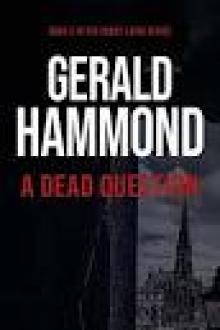 A Dead Question
A Dead Question Twice Bitten
Twice Bitten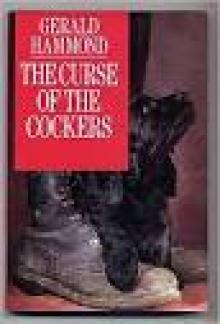 The Curse of the Cockers
The Curse of the Cockers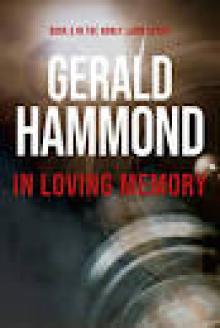 In Loving Memory
In Loving Memory Illegal Tender (Three Oaks Book 12)
Illegal Tender (Three Oaks Book 12)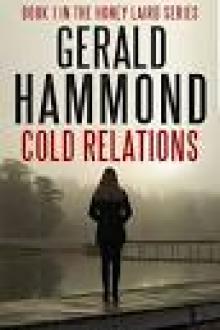 Cold Relations (Honey Laird Book 1)
Cold Relations (Honey Laird Book 1)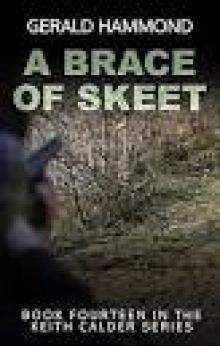 A Brace of Skeet
A Brace of Skeet Silver City Scandal
Silver City Scandal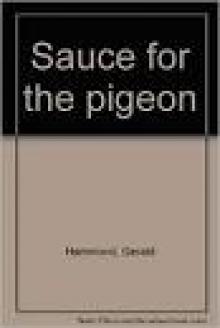 Sauce For the Pigeon
Sauce For the Pigeon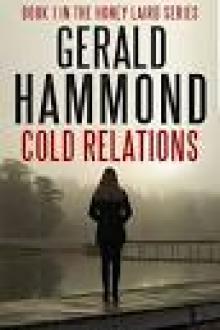 Cold Relations
Cold Relations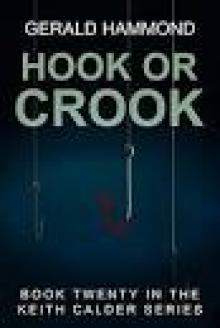 Hook or Crook
Hook or Crook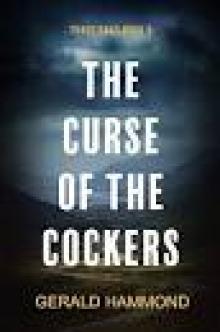 The Curse of the Cockers (Three Oaks Book 5)
The Curse of the Cockers (Three Oaks Book 5)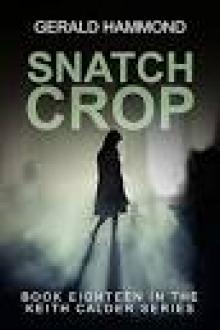 Snatch Crop
Snatch Crop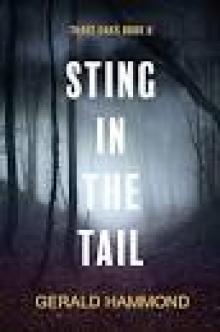 Sting in the Tail (Three Oaks Book 6)
Sting in the Tail (Three Oaks Book 6)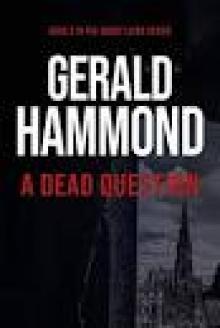 A Dead Question (Honey Laird Book 2)
A Dead Question (Honey Laird Book 2)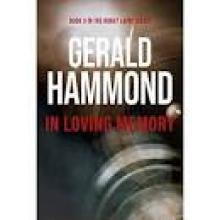 In Loving Memory (Honey Laird Book 3)
In Loving Memory (Honey Laird Book 3) Thin Air
Thin Air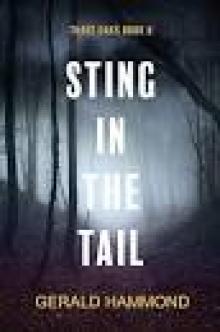 Sting in the Tail
Sting in the Tail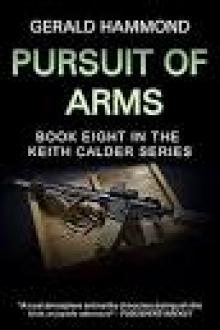 Pursuit of Arms
Pursuit of Arms The Game
The Game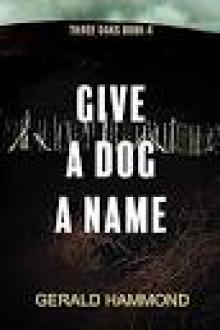 Give a Dog a Name (Three Oaks Book 4)
Give a Dog a Name (Three Oaks Book 4) Fair Game
Fair Game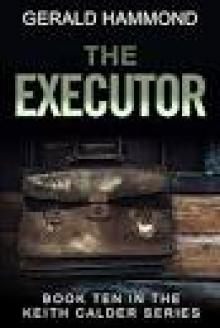 The Executor (Keith Calder Book 10)
The Executor (Keith Calder Book 10) Whose Dog Are You? (Three Oaks Book 2)
Whose Dog Are You? (Three Oaks Book 2)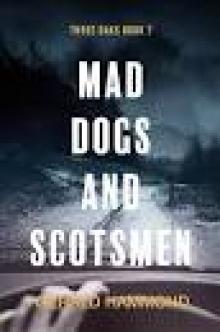 Mad Dogs and Scotsmen (Three Oaks Book 7)
Mad Dogs and Scotsmen (Three Oaks Book 7) Cousin Once Removed
Cousin Once Removed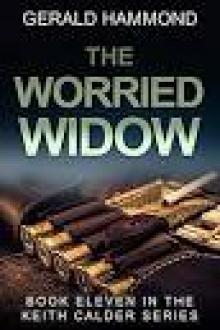 The Worried Widow
The Worried Widow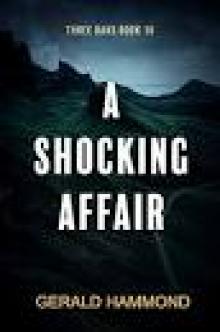 A Shocking Affair
A Shocking Affair Dead Weight (Three Oaks Book 11)
Dead Weight (Three Oaks Book 11) Whose Dog Are You
Whose Dog Are You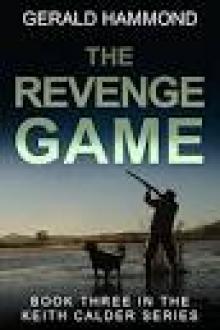 The Revenge Game
The Revenge Game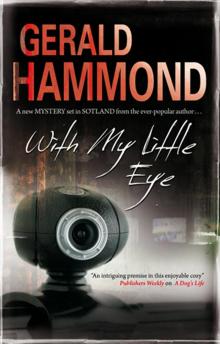 With My Little Eye
With My Little Eye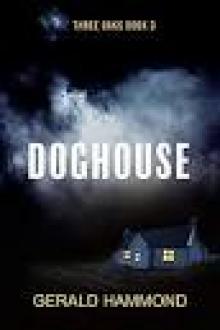 Doghouse (Three Oaks Book 3)
Doghouse (Three Oaks Book 3)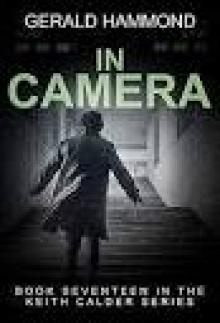 In Camera
In Camera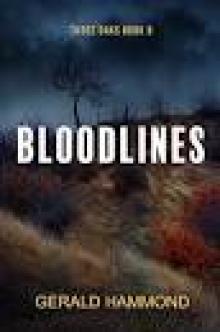 Bloodlines (Three Oaks Book 8)
Bloodlines (Three Oaks Book 8)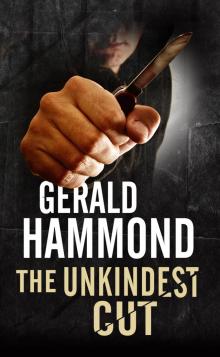 The Unkindest Cut
The Unkindest Cut